Abstract
In this article we reevaluate the descriptions of Jain loka while reading the descriptions of various geographical entities as metaphorical references of similar entities in space and sketch revised layout of the Jain loka which carries the essence of annals, and also is in sync with modern scientific findings and proposed theories about the universe.
Keywords
Adho Loka
Bharat Kshetra
Cosmology
Jambu Dvipa
Kalachakra
Lokakasha
Madhya Loka
Universe
Urdhva Loka
Introduction
Since the modern science have proved that the earth is not flat and that its not the center of universe, the religions across the globe have been in a limbo and have left the world divided into two camps. First of the liberals, who have either dejected religions and have turned atheist, or have written it off as archaic ways of ancestors which are no more valid. The second is that of fanatics that refuse to accept scientific findings as facts and believe only in their scriptures, how-so-ever irrational they may sound.
Jainism is no exception. Various scholars in our creed have often tried hard to proof that science is wrong when it says that earth is spherical and that its not the centre of the universe and have two sets of sun moon and stars roving around it. In fact, there are researches carried out on this aspect and various books published to discredit the factual findings of science, making Jains an object of mockery and ridicule.
These discrepancies of Jain annals and our pursuit to discredit science have left a lot of young and modern educated Jains wonder on the authenticity of our annals. These discrepancies become all the more vivid with very artistically drawn-out detailed maps of flat earth in various temples and books depicting geographic mountains, rivers, oceans, forts and caves with roving two sets of sun and moon. These leave the educated and logically inclined people with the big question mark on the very authenticity of the religion. Afterall, how can any sane mind ever believe in concepts which cannot be proved like karma, reincarnations, heavens, hells and moksha, when the concepts that can be proved themselves have been falsified?
This Catch-22 situation led a lot of scholars revisit Jain annals and try and bring out alternate theories on what the annals actually mean. While Dr Jeoraj Jain came up with a statistical model to help us understand the meaning of Jain loka, researchers like Mahendra Jain and Narayan Lal Kachhara took to cosmic understanding of Jambu Dvipa to solve the riddle. Prof Narendra Bhandri hypothesized Earth as Jambu Dvipa and various other dvipas as planetary orbits and formulated his hypothesis.
In this article, I shall proceed with the cosmic understanding of the Jambu Dvipa and scrutinize the same against the scientific understanding of the universe. At some places you will find this hypothesis completely in sync with science and at some places, you will find it at odds with the currently believed theories. Wherever, I shall confront with the second, I shall propose an alternate model to the mostly believed theory in science along with evidence supporting the same and predictions, that if found true shall be understood as vindication of my model.
METHODOLOGY AND APPROACH
- Investigation of the root cause of the problem
- Formulating the Hypothesis
- Review of Annals with formulated hypothesis
- Summary of Assumptions made in the hypothesis
- Validating these assumptions in hypothesis scientifically and proposing alternate scientific models wherever the hypothesis is at odds with most believed scientific theories along with evidence in favor of the alternate model and predictions to validate the same
- Conclusion
THE ANALYSIS
1. Investigation of the root cause of the problem.
The flat earth model of Jainism primarily comes from the various loka maps engraved in our temples and depicted in various books on Jainism along with commentaries of Jain annals. In these commentaries, Bharat Kshetra is often equated to historic Akhand Bharta and Jambu Dvipa to our earth leading to flat earth theory.
However, it must be noted that neither these commentaries nor the maps were given to us by Jina – The Mahavira. The closest source that we have to what the enlightened master described about the loka is our Annals, which too are not the firsthand descriptions of the subject under review as these are dialogues between Jambu Swami and Sudharma Swami on what Jina told about the subject.
Sudharma Swami was a disciple of Indrabhuti Gautama Swami– the only Gandhara (direct disciple) of Mahavira who was not enlightened at the time of Nirvana of the master. All Jain annals are a description of what Gautama, in the wake of His own unenlightened state enquired about the subject from Mahavira. These instructions were in turn given over to Sudharma who in turn imparted them to Jambu and it’s the dialogue between these last two links which forms the basis of our annals. These annals then in turn passed orally generation after generation till the time of the great draught during Chandragupta times where on realizing that the masters who mugged them up are gradually decreasing and thus fearing the complete loss, the blessed souls of the time decided to pen them down.
Thus, in general, what we get from the above understanding is that Suttas on the subject passed from:
- Enlightened Mahavira to unenlightened Gautama (He achieved enlightenment only at the age of 80)
- Probably unenlightened Gautama to unenlightened Sudharma (Sudharma attained enlightenment only at the age of 92)
- Probably unenlightened Sudharma to unenlightened Jambu
- Orally from unenlightened masters to unenlightened disciples till the days of Chandragupta Maurya
- Thus, the annals had an oral transmission of around 300 years before they were penned.
Now, lets realize that there is a limit to human memory, and oral transmissions can never be perfect. This becomes all the more evident based on the fact that when these annals were presented to the Acharaya Bhadrabhau, the last Shrut-Keveli of our times, He discarded them as blemished and thus there ought to be some mistake in them. What makes the authenticity of these annals all the more questionable is the fact that the original copies of these annals were lost over time, and these were rewritten between 5th to 15th century by various Acharyas. The details of the same may be referred to in the article ‘Jain Cosmology & Universe’ written by Prof. Narayan Lal Kachhara.
Thus, as we proceed with our analysis, the first thing that we need to keep in mind is that the annals may not be exactly as revealed by Mahavira and understand that even though the essence of the message of the Masters would have been preserved, there may be some adulteration specially in the numerical parts which might have creeped in due to limitations of human mind.
Second thing that we may safely assume from the above chronology is that the knowledge is being imparted from an enlightened master to someone who lacks the ability to witness the subject being discussed in first place. In such a case, the only way to explain things would have been to use similes of similar things that the unenlightened seeker could understand. For example, if Gautama were to ask an omniscient on what an airplane is, then could it not be safely assumed that the omniscient would have described the airplane to be a giant bird which carries humans in its belly and flies from one city to another?
What I am trying to bring forth here is that because Gautama was unable to witness the whereabouts of Jambu Dvipa and Lokakasha on His own, the only way available for Mahavira to explain these descriptions was referring them to something that Gautama could relate too. This understanding is going to the basis of our entire hypothesis in this article.
Third thing that we should remember is that the maps which we have in our temples and the essays describing the flat earth and two sets of sun and moon are the product of the annals described above. Thus any attempts to explain these maps, or essays will not lead to solving the riddle of Jain annals as the suttas in annals will still glare back on our face as discrepancies. Thus the solution to the above Jain riddle lies in deciphering the true meaning and message in annals and not the products of the annals
2. Hypothesis
As marked above, the correct way to read our annals is to understand that they were being imparted by someone who had a firsthand understanding of the subject to someone who lacked the faculty to witness it on his own. Thus, the language that the seer would have used to describe the subject to seeker would have been metaphorical and should be thus read instead of their verbal meaning.
These metaphorical meanings should be hypothesized as under:
- Dvipa (island) – a cosmic entity that looks like an island when seen from a distance.
- Ocean – Vast stretches of nothingness in between the cosmic entities marked as Dvipa (island)
- Mountain – The big daddy of the cosmic entity being described which dwarfs everything else in surrounding, the same was as our sun dwarfs the planets around.
- Sun, moon and stars – sum total of all celestial bodies visible from the surface it’s referred against.
- River – something similar to hypothesized wormholes that could be used for intergalactic travel by souls.
- Forts – Natural frontiers of a cosmic entity, similar to the wall of fire at the end of our solar system.
- Gavaksh (obturator) – Formation of celestial objects that covers a region giving it an opening or closing at it revolves around the axis.
3. Review of Annals with above hypothesis
JAMBU DVIPA
A general view that Jain annals gives of the Jambu Dvipa is as under:
Mt Meru Is At The Center Of The Middle World Surrounded By Jambu Dvipa In Form Of A Circle (Like A Wheel Of A Chariot), Forming A Diameter Of 100,000 Yogans… [1]
In a celestial understanding of the entity of Jambudvipa, it may be artistically represented as Fig-1 – an entity which apperals like an island in the ocean of nothingness.
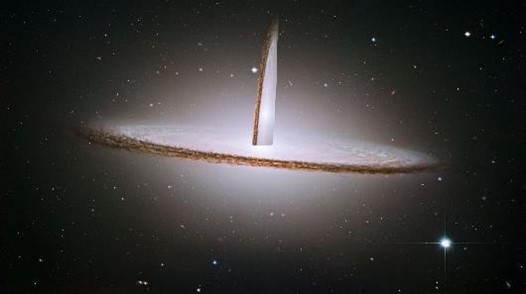 Fig-1
Fig-1The above entity could be hypothesized as the SumTotal of galaxies bound together vide a central axis. (We will scientifically evaluate the possibility of such a structure in next section)
Jambudvipa Is Divided Into Seven Regions (Kshetras) – Bharat Kshetra, Airavat Kshetra, Haimvant Kshetra, Hairanvat Kshetra, Harivarsh Kshetra, Ramyakvarsh Kshetra, Mahavideh Kshetra. [1]
The above should be hypothesized as various regions with habitable planets in various galaxies of the above celestial super structure where alien human life forms thrive. The first among these regions is Bharat Kshetra with planet earth, and the last of the regions is Airavat Kshetra with a planet similar to our earth as marked in Fig-2.
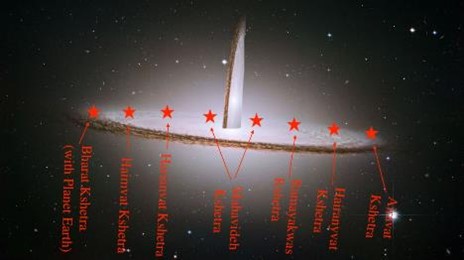 Fig-2
Fig-2All these planets, in their respective galaxies rove on their orbit around the central axis of Mt Meru which leads to cosmic cycles called Kalachakra. This orbit, for our galaxy and that of the planet in Airavat Kshetra should be seen as elliptical. Just as elliptical orbit of earth around sun leads to self-repeating oscillating seasons, same way the elliptical orbit of our galaxy around Mt Meru leads to self-repeating oscillating epochs of Kalachakra, making our planet a literal paradise at some point of time and a literal hell at the other, with close windows where the situation is just right to achieve liberation. Similarly, the orbits of galaxies in regions other than Bharat Kshetra and Airavat Kshetra should be seen as circular, which means that the conditions there remains consistent as their galaxies rove around Mt Meru.
There Are Six Varshdhar Mountains Which Divide Jambu Dvipa Into Seven Distinct Regions [1]
Just as our sun keeps all its planets, comets and asteroids in its gravitational sphere, giving solar system an entity, and just as blackholes keep all the stars within its sphere of influence making galaxies an entity, the mountains marked in Jain annals should be hypothesized as massive celestial bodies that keep specific galaxies of the Jambu Dvipa within their sphere of influence making them carve out distinct regions within this super entity.
If We Divide This Jambu Dvipa From East To West And From North To South In 124 Mandals, Then in ¼th Part of South-East And North-West Of This Mandal And 800 Yogans Above This Extremely Memorable Part Of This Ratan-Prabha Prithvi (planet) There Appears Two Suns. [2]
The above sutra explains the position of the sun – a life giving star to planet (prithvi) in its vicinity. It marks, that if we divide the entire chariot wheel shaped Jambu Dvipa into 124 equal part’s, then there appears one sun in the 1/4th part of its south-east, and one sun in the 1/4th part of its north-west as marked in below Fig-3.
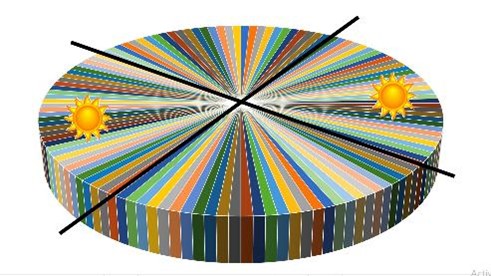 Fig-3
Fig-3If we super impose this structure and position of these suns over the Fig-1 that we derived of Jambudvipa, it tends to mean that 1st sun, illuminates Bharat Kshetra and the 2nd sun illuminates the Airavat Kshetra as in Fig-4.
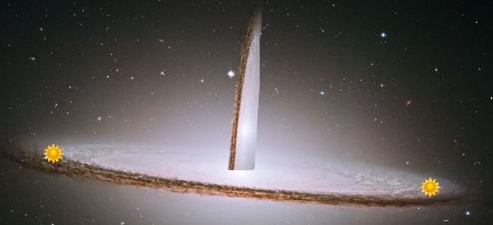 Fig-4
Fig-4Thus the two suns marked in annals are in two different galaxies in opposite corners of celestial superstructure called Jambu Dvipa and not on our earth,
There Exists A Jagiti Prachir (fort) on all sides of Jambudvipa. Its Eight Yogan High. It’s respectively 12, 8 and 4 Yogan’s wide at its base, middle and top.
This Prachir (fort) should be hypothesized as a natural frontier of the superset of all the galaxies that collectively constitute Jambu Dvipa and prevents entry and exit of materials from outer space. It should be considered similar to the wall of fire that exists just between the boundary of solar system and interstellar space as in below Fig-5.
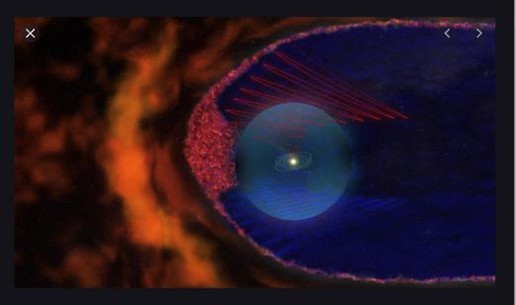 Fig-5
Fig-5This wall of fire around solar system claims science is made of plasma at the temperature of 49426.667 degrees Celsius, that makes it extremely illuminous. Jain annals describe the similar illuminous fort like celestial structure surrounding Jambu Dvipa in below sutta:
(Jagiti Prachir’s) Shape Is Like That Of The Tail Of A Cow, It’s Full Of Gems, Is Soft, Is Illuminous And Is Extremely Beautiful. [1]
Further describing Jambu Dvipa’s exterior, Annals mark.
On All The Four Sides of This Wall (Jagiti Prachir) There Is Perforated Gavaksh (obturator) [1]
This tends to convey that the entry and exit into the Jambu Dvipa is not completely obstructed and the perforated gavaksh marked above could be hypothesized as a thick layer of asteroids similar to the kuiper belt in our solar system which orbit the Prachir and lets its entry and exit open and close as these asteroids rove around their axis.
Another interesting sutta in annals which makes the celestial nature of Jambudvipa more evident is as under:
In The Middle Of Jagiti Prachir (Fort), There Exists One Padhvar Vedica…..Which Is Eternal [1]
This sutta is very interesting. Describing “Padhvar Vedica” as the eternal entity in Jambu Dvipa means that rest of the constituents of this cosmic entity are not eternal. What this means is that the planets and galaxies which constitute Jambu Dvipa have not always been there, and that they are born and will die, while the Jambu Dvipa per-se continues along with its various regions. What this may mean is that earth may not be eternal, and in distinct past, there may be other planets in Bharat Kshetra region of universe that would have housed humanity and that earth may not always survive and that in future we humans may find ourselves settled on another planet in our region. Vedica is an alter where fire is burned while performing yagna’s. Thus this Padhvar Vedica may be hypothesized as that eternal Nebula from where all the matter that forms Jambu Dvipa originated from.
BEYOND JAMBU DVIPA
Jain annals mark concentric ring shaped oceans and dvipa’s (islands) beyond Jambudvipa. These dvipa’s could be hypothesized as parallel universes beyond our universe and oceans as spaces which divide these parallel universes. Jain annals mark 7 such parallel universes beyond ours (Jambu Dvipa) viz. Ghakti Khanda, Pushkarvar Dvipa, Varuna Dvipa, Kshirvar Dvipa, Ghrutvar Dvipa, Ikshuvar Dvipa and Nandishwar Dvipa and further mark that intelligent life exists on the whole of Ghakti Khanda and half of Pushkarvar Dvipa. This should be understood as existence of habitable planets in the whole of Gakhti Khanda and half of Pushkarvar Dvipa. These concentric, parallel universes could be artistically envisioned as Fig-6.
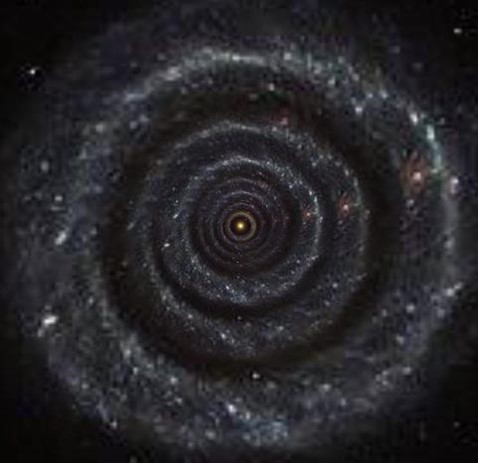 Fig-6
Fig-6Collectively, this entire super structure of all the Dvipas (islands) is marked in Jain annals as Middle World – the adobe of humans, animals, insects, and plants. This entire structure is described as a flat plain. This flatness of the universe should not be envisioned like paper thin, but relatively flat as compared to its sheer size and circumference.
BEYOND THE MIDDLE WORLD
Jain annals describe multiple plains above and below the middle world of heavens and hells respectively. These could be envisioned as parallel universes above and below the middle world, with their own set of planets that houses demigods and hellish beings. Collectively all these three planes together constitute a super cosmic entity referred to as Lokakasha in Jainism.
All these planes should be envisioned as round and the box structure that we often found in Jain temples like fig-7 below is a misrepresentation of the Lokakasha.
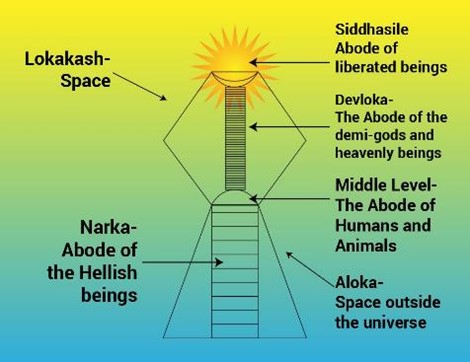 Fig-7
Fig-7It’s because Bhagvati Sutra clearly marks the shape of Lokakasha as made up of three bowls [3]. The 1st bowl placed upside down, the 2nd bowl place straight over the 1st and the 3rd bowl again placed upside down over the second. Bowl is a circular object, and thus the collective shape this placement will make should also be circular, and not squarish as often misrepresented to show Jain Lokakasha as in the famous Jain temples of Jambudvipa in Meerut.
The correct three-bowled shaped multiple flat disk shaped universes, one above the other may be best artistically represented as Fig-8 below.
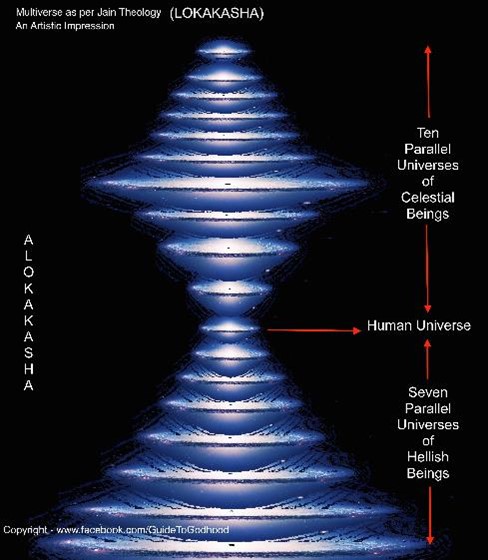 Fig-8
Fig-84. Summary of Assumptions made in the hypothesis
- This universe (marked as Jambudvipa) is flat
- This universe is revolving
- This universe has a central axis
- Collectively, the universe looks like an island in the ocean of space.
- The galaxies, stars and planets which constitute the universe are not eternal. They are created at a point and will also end.
- Existence of Parallel universes (concentric rings of middle world an heavens and hells)
These assumptions needs to pass scientific investigation and must be in sync with known natural laws for this hypothesis to be considered in sync with science. In the below section we shall undertake this investigation.
5. Validating these assumptions in hypothesis scientifically
1. This universe is flat
A simple way to calculate the flatness of a surface is to draw a triangle and calculate its angles. If the angels total 180 degrees, the surface is flat and if they don’t, its curved. Scientists have performed the same experiment by drawing triangles over distant galaxies and have confirmed that the universe as we view it is flat and thus this assumption passes the test of scientific investigation.
2. This universe is revolving
The current most prevalent scientific models of the universe predict that universe is ever expanding and thus not revolving. Its based on some serious scientific calculations like red shifts and existence of near uniform cosmic microwave background that was a prediction based on the Big Bang theory and thus the hypothesis proposed above fails this scientific validity.
However, it must be remembered that this theory of Big Bang and ever expanding universe is not yet a scientifically established fact and is just the most preferred hypothesis based on the above marked parameters. However there are many aberrations to the same. Some of these are as under:
- The size of universe. The universe is just too huge to make the age of the universe justify the spread of matter as no material object can ever travel higher than the speed of light.
- The Blue shifts witnessed in galaxies suggest that there are galaxies coming closer to each other. This is not possible had galaxies been ever expanding since the proposed Big bang
- Shapley Attractor and the Dipole Repeller as in Fig-9 seems to suggest that galaxies does follow an organized flow and are not just flying away from each other endlessly.
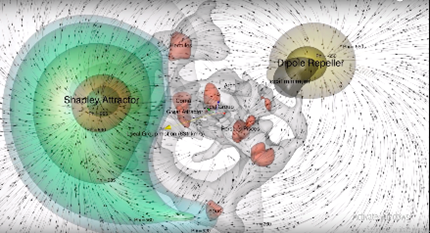 Fig-9
Fig-9The above anomalies in Big Bang does raise a question mark on its authenticity and opens the room for more theories that could explain the above unexplainable natural phenomenon and also be in sync with data in support of ever expanding theory.
This opens the room for the theory of ‘revolving universe because if the universe is actually revolving, then
- Red shifts could be a product of galaxies moving away from each other on their own orbits.
- Blue shifts could be the product of galaxies coming closer to each other on their own orbits.
- Cosmic Microwave backgrounds would be fairly equal because universe acts as a churning machine and spreads them evenly across the space
- The repulsion of galaxies as we experience from the Dipole Repeller and the attraction of galaxies that we experience towards the Shapley Attractor could be the product of revolving nature of universe.
Prediction
Everything in this universe is revolving. From the tiny asteroids to the massive stars, everything revolves around something else and galaxies could be no exceptions. If the universe is indeed revolving, the galaxies would need to be revolving too and there would exist a central axis, massive enough to bind all these galaxies in order and set them rolling.
No natural phenomenon can ever remain elusive to the investigative nature of our curious scientists, and if the galaxies are actually revolving, then it cannot ever remain unfound. If its ever discovered, then take this as a vindication of revolving universe and the above validity of the hypothesis of Jain annals. If its ever found otherwise, the theory of revolving universe and the above hypothesis of Jain cosmology may be discarded.
3. The Universe has a central axis
Again, like point 2 above the current most accepted models of cosmology does not suggest so. However, if the model of revolving universe is to be found acceptable, then by default a central axis becomes a possibility because anything that revolves needs a binding force.
4. Collectively, the universe looks like an island
If the galaxies are actually revolving with a central axis, then the sum total of these galaxies needs to have a form and when looked from outside, all the galaxies that constitute this structure should de-pixilate into creating a unified look. This should happen just the same was as stars team up and make a galaxy appear like an entity in space even though the stars which constitute the galaxy maybe separated by millions of light years. The same principle should also hold true for a super set of galaxies if it actually exists.
5. Galaxies, stars, planets and other cosmic entities are nit eternal.
Science does validate the same and claim that our own star – Sun had a birth date and there will also be a day when it will burn out, and thus is not eternal.
6. Existence if parallel universes.
This hypothesis is generally accepted by scientists and they do envision the possibility of existence of parallel universes though they don’t have any concrete evidences of their existence yet. The fact that their existence cannot be empirically ruled out vindicates this hypothesis on scientific parameters.
6. CONCLUSION
Jain annals should be read metaphorically in a cosmic manner with equating
- Bharat Kshetra as our planet
- Jambudvipa as the sum-total of all the visible and yet to be discovered galaxes that collectively form an entity
- Other dvipas marked in annals should be understood as parallel universes with habitable planets on the first 1-1/2 dvipas following Jambu Dvipa
- Heavens and Hells should be understood as parallel universes above and below middle world with planets inhabited by demigods and hellish beings.
Such understanding not only solves the riddles of flat world and two sets of sun and moons but also makes Jain annals completely in sync with scientific understanding and knowledge.
Acknowledgements
I would like to express my gratefulness to Dr Jeoraj Jain, author of the book- “Lokakasha – Eik Vegyanik Anushalin” & author of the paper “Scientific interpretation of Jain Lokakasha Map” for helping be mature my hypothesis and guiding me into writing a paper on the same.
References
[1] Shri Jambudvipa Pragyapti sutra
[2] Shri Surya Pragyapti Sutra
[3] kachhara, narayan lal, jain cosmology and universe
 Amit Jain
Amit Jain